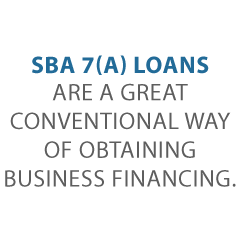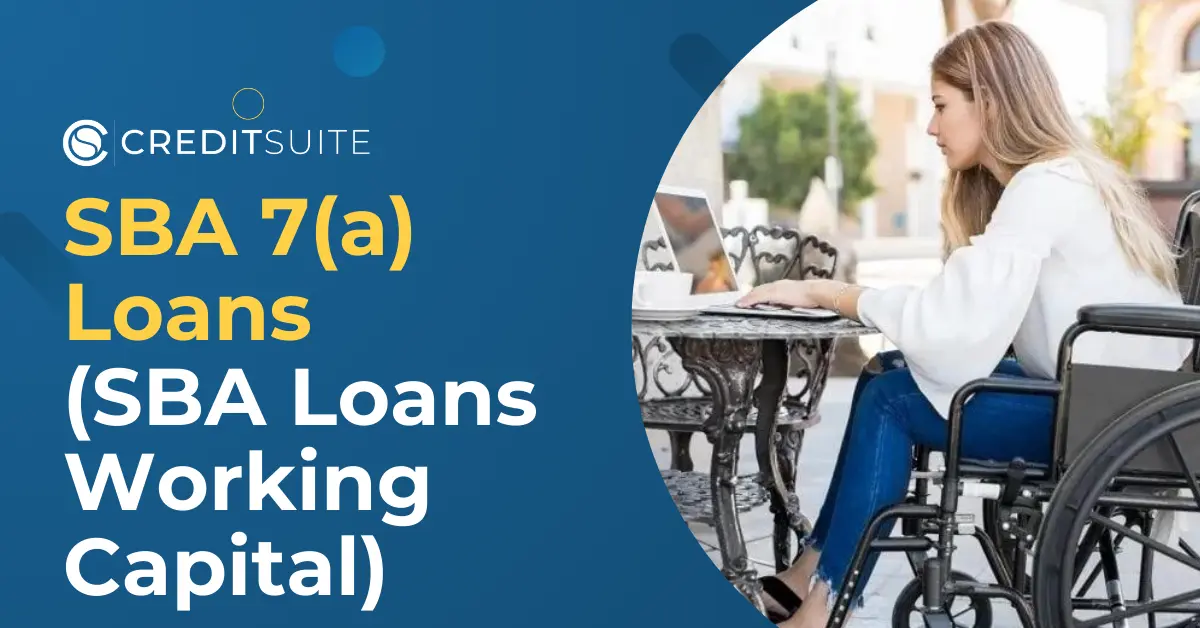Yes, You Can Get SBA Loans Working Capital
SBA loans working capital could be your ticket to business funding!
Small Business 7(a) loans are well known and loved in the business community.
If you are awarded a 7(a) loan, you can use the loan proceeds to establish a new business. Or you can use them to help in the acquisition, operation, or expansion of an existing business.
Details on SBA Loans Working Capital Uses
Directly from the SBA, here are some of the uses for loan proceeds:
- To buy land or buildings, to cover new construction as well as expansion or conversion of existing facilities
- The purchase of equipment, machinery, furniture, fixtures, supplies, or materials

- Long-term working capital, including the payment of accounts payable and/or the purchase of inventory
- Short-term working capital needs, including seasonal financing, contract performance, construction financing and export production
- Financing against existing inventory and receivables
- The refinancing of existing business indebtedness that is not already structured with reasonable terms and conditions
- To buy an existing business
An Alternative: Business Credit
Small business credit is credit in a business’s name. It doesn’t tie to an owner’s consumer credit, not even when the owner is a sole proprietor and the only employee of the company.
Because of this, a business owner’s business and consumer credit scores can be very different.
The Advantages
Since small business credit is separate from personal, it helps to safeguard a business owner’s personal assets, in the event of litigation or business bankruptcy.
Also, with two distinct credit scores, an entrepreneur can get two separate cards from the same vendor. This effectively doubles buying power.
Another advantage is that even startups can do this. Heading to a bank for a business loan can be a formula for frustration. But building small business credit, when done properly, is a plan for success.
Consumer credit scores rely on payments but also other considerations like credit usage percentages.
But for business credit, the scores really just depend on if a small business pays its debts in a timely manner.
The Process
Establishing company credit is a process. It does not occur without effort. A business must actively work to develop small business credit.
Still, it can be done easily and quickly, and it is much speedier than establishing consumer credit scores.
Vendors are a big part of this process.
Accomplishing the steps out of sequence causes repetitive rejections. Nobody can start at the top with company credit.
Small Business Fundability
A company needs to be fundable to lending institutions and merchants.
For this reason, a company needs a professional-looking website and email address. And it needs to have site hosting from a company like GoDaddy.
Additionally, business telephone numbers must have a listing on 411. You can do that here: https://www.listyourself.net.
At the same time, the business phone number should be toll-free (800 exchange or comparable).
A company also needs a bank account dedicated purely to it, and it needs to have all of the licenses necessary for running.
Licenses
These licenses all have to be in the correct, appropriate name of the company. And they must have the same small business address and phone numbers.
So keep in mind, that this means not just state licenses, but possibly also city licenses.
Dealing with the Internal Revenue Service
Visit the Internal Revenue Service website and get an EIN for the company. They’re free. Select a business entity such as corporation, LLC, etc.
A company may get started as a sole proprietor. But they absolutely need to switch to a form of corporation or an LLC.
This is to decrease risk. And it will maximize tax benefits.
A business entity matters when it involves tax obligations and liability in the event of a lawsuit. A sole proprietorship means the entrepreneur is it when it comes to liability and tax obligations. Nobody else is responsible.
The best thing to do is to incorporate. You should only look at a DBA as an interim step on the way to incorporation.
Starting Off the Business Credit Reporting Process
Begin at the D&B website and get a free D-U-N-S number. A D-U-N-S number is how D&B gets a business in their system, to generate a PAYDEX score. If there is no D-U-N-S number, then there is no record and no PAYDEX score.
Once in D&B’s system, search Equifax and Experian’s web sites for the small business. You can do this at www.creditsuite.com/reports. If there is a record with them, check it for correctness and completeness. If there are no records with them, go to the next step in the process.
In this way, Experian and Equifax have something to report on.
https://creditsuite.wistia.com/medias/1rpvzn0f8n?embedType=async&videoFoam=true&videoWidth=640
Starter Vendor Credit
First you ought to build trade lines that report. Then you’ll have an established credit profile, and you’ll get a business credit score.
And with an established business credit profile and score you can begin to get credit for numerous purposes, and from all sorts of places.
These kinds of accounts often tend to be for things bought all the time, like marketing materials, shipping boxes, outdoor work wear, and office furniture.
But to start with, what is trade credit? These trade lines are credit issuers who give you starter credit when you have none now. Terms are frequently Net 30, rather than revolving.
So, if you get approval for $1,000 in vendor credit and use all of it, you need to pay that money back in a set term, such as within 30 days on a Net 30 account.
Details
Net 30 accounts have to be paid in full within 30 days. 60 accounts have to be paid in full within 60 days. In contrast to revolving accounts, you have a set time when you have to pay back what you borrowed or the credit you made use of.
To launch your business credit profile the right way, you need to get approval for vendor accounts that report to the business credit reporting bureaus. Once that’s done, you can then use the credit.
Then pay back what you used, and the account is on report to Dun & Bradstreet, Experian, or Equifax.
Vendor Credit – It Makes Sense
Not every vendor can help like true starter credit can. These are vendors that grant approval with minimal effort. You also want them to be reporting to one or more of the big three CRAs: Dun & Bradstreet, Equifax, and Experian.
As you get starter credit, you can also start to get more credit. Here are some stellar starter vendor choices from us.
Accounts That Don’t Report
Non-reporting trade accounts can also be helpful. While you do want trade accounts to report to a minimum of one of the CRAs, a trade account which does not report can still be of some worth.
You can always ask non-reporting accounts for trade references. Plus, credit accounts of any sort can help you to better even out business expenditures, therefore making financial planning easier.
Monitor Your Business Credit
Know what is happening with your credit. Make sure it is being reported and attend to any mistakes as soon as possible. Get in the practice of checking credit reports. Dig into the particulars, not just the scores.
We can help you monitor business credit at Experian, Equifax, and D&B for 90% less than it would cost you at the CRAs.
Update Your Record
Update the info if there are inaccuracies or the relevant information is incomplete.
Fix Your Business Credit
So, what’s all this monitoring for? It’s to dispute any problems in your records. Mistakes in your credit report(s) can be corrected. But the CRAs usually want you to dispute in a particular way.
Disputes
Disputing credit report mistakes typically means you precisely itemize any charges you challenge.
A Word about Business Credit Building
Always use credit responsibly! Don’t borrow more than what you can pay off. Track balances and deadlines for repayments. Paying on time and fully does more to raise business credit scores than nearly anything else.
Establishing company credit pays off. Good business credit scores help a business get loans. Your lending institution knows the small business can pay its financial obligations. They know the business is for real.
The company’s EIN links to high scores and lenders often won’t feel the need to ask for a personal guarantee.
Business credit is an asset which can help your business in years to come. Learn more here and get started toward building small business credit.
SBA Loans Working Capital: Takeaways
SBA 7(a) loans are a great conventional way of getting business financing

